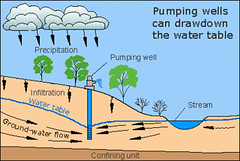Sustainability is the capacity to endure, says Wikipedia.
In ecology the word describes how biological systems remain diverse and productive over time. For humans it is the potential for long-term maintenance of well being, which in turn depends on the maintenance of the natural world and natural resources.[1]
Sustainability has become a wide-ranging term that can be applied to almost every facet of life on Earth, from local to a global scale and over various time periods.
Long-lived and healthy wetlands and forests are examples of sustainable biological systems. Invisible chemical cycles redistribute water, oxygen, nitrogen and carbon through the world's living and non-living systems, and have sustained life since the beginning of time. As the earth’s human population has increased, natural ecosystems have declined and changes in the balance of natural cycles has had a negative impact on both humans and other living systems.[2]
Paul Hawken has written that "Sustainability is about stabilizing the currently disruptive relationship between earth’s two most complex systems—human culture and the living world.”[3]
Ways of living more sustainably can take many forms from reorganising living conditions (e.g., ecovillages, eco-municipalities and sustainable cities), reappraising economic sectors (permaculture, green building, sustainable agriculture), or work practices (sustainable architecture), using science to develop new technologies (green technologies, renewable energy), to adjustments in individual lifestyles that conserve natural resources.
skip to main |
skip to sidebar
For students and parents who love education and exploration of the social sciences . . .
Search This Blog
Followers
Blog Archive
-
▼
2010
(346)
-
▼
September
(42)
- Magnet recycling is back, courtesy of pick-up and ...
- Another way to earn Indie points: an essay on a vi...
- The California Map Project - test your peers and f...
- Indie work: integrating the bios of Leo Fender and...
- John Muir, father of the national parks and Sierra...
- Our mission: Be responsible, respectful and seek e...
- Tectonica: last week's quiz and the source of the ...
- California Dreamin: songs about the Golden State
- Topics in the California Project
- A Walk in the Garden: Talent Show on Fri, Sept 24,...
- Getting to know the Pacific rim: California quiz
- The glories of the Golden State, California
- Sustainability: a key term for the coming generations
- A pre-quiz quiz: more tectonics
- The science and medical research that explains the...
- Plates that will crack in a spectacular and nation...
- World geography project: what's inside Spaceship e...
- Indie work - comparison essays
- Pratt Industries: recycling for Shreveport and man...
- Mary Bennett Cane, Shreveport's first important bu...
- Cyberbullying an issue in Upfront magazine: "Techn...
- Demographics, the study of populations
- Guidelines for comparison essays in geography clas...
- Indie work: comparing Henry Miller Shreve and Lark...
- Open notes quiz Tues/Wed: 5 themes of geography an...
- Cochon de lait is the Cajun French term for a pig ...
- Shreveport in Place and Location: the Texas Trail ...
- Syllabus, Magnet geography / Trudeau / 2010-2011
- Quiz #2: Hydrologists & Kinesiologists
- Henry Miller Shreve, the steamer & flat boat and a...
- Coates Bluff Nature Trail, adjacent to Magnet, Sto...
- Mapping overview / East Shreveport; Magnet and nei...
- Reviewing the 5 Themes of Geography
- Stoner Ave at Fant Parkway: Riverscape development...
- Back to school night: Thurs, Sept 9, 5:30 pm
- Class of 2014 Speed Meet on Fri, Sept 10, 6:30 - 8...
- Sketching / mapping the Magnet campus
- Bees at RW Norton Art Foundation, Shreveport; why ...
- Because of the British Empire, we look for this si...
- Indie work (independent): building bonus points an...
- No question that Otzi's an indigenous fellow
- 5 Themes of Geography / Shreveport Bossier
-
▼
September
(42)

